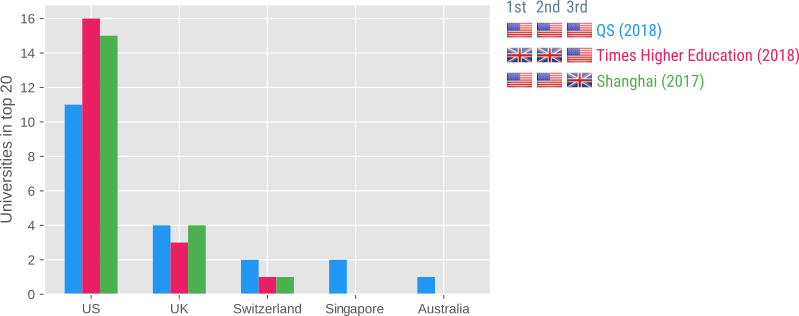Every year, all universities in the world are ranked by academic excellence. (I'm only going to use the term 'academic excellence' once, because every time I write it, I vomit a little in my mouth.) These rankings are created by three self-appointed authorities: QS, The Times of Higher Education, and The Shanghai Rankings.
Below you can see where the Top 20 universities come from:

The most striking feature of these rankings is that the Top 20 consists almost entirely of US and UK institutes. In fact, only five countries appear in any of the three Top 20s: US (42×), UK (11×), Switzerland (4×), Singapore (2×), and Australia (1×). And the Top 3 even consists entirely of US (6×) and UK (3×) institutes.
Not all universities are equally good, and I have no problem accepting that Oxford (#6 according to QS) is in all respects a better university than my previous academic home of Aix-Marseille Université (#411-420 according to QS). And universities may, on average and by some measures, be a bit better in one country than another. That's fine.
But the suggestion that, to a good approximation, the US and the UK are the only countries in the world where you can find good universities is ridiculous. What about Japan? What about Germany? What about France—how did Emmanuel Macron become president after receiving an education (well, if you can call it that!) at lowly Paris Nanterre (#801-1000 according to QS)? Compare that to Donald Trump, who was educated at a prestigious Top 20 institute (U Pennsylvania, #19 according to QS). And let's be honest: you can tell the difference in intellectual capacity between the two.
The problem with these rankings is, of course, that you cannot measure the quality of a university in any meaningful way, just like you cannot measure the beauty of a painting. When it comes to really beautiful paintings and really ugly paintings, many people agree. But more subtle differences are a matter of taste. And the same is true for university rankings.
So, lacking objective criteria, how are the World University Rankings created?
The details differ a bit between the three rankings (see methods for QS, THE, and Shanghai), but there are certainly some dubious criteria in there, such as the number of papers published in Nature and Science, which is used as a criterion by the Shanghai rankings. This directly goes against the San Francisco Declaration on Research Assessment, as well as many other authorities, which explicitly states that scientific output should not be judged based on where it is published—and for good reason, because objective measures show that the more prestigious a scientific journal, the lower the quality of the science in it. (See for example this paper by Björn Brembs.)
But the main determining factor seems to be reputation; that is, if I understand correctly, academics are simply asked which universities they feel are the best. This is amusingly circular, because which universities academics feel are the best is in part determined by the same rankings that these feelings are used to create.
So how does all of this result in such a pronounced bias in favor of US and UK universities? I honestly don't know. But it seems clear to me that World University Rankings are mostly interesting as a sociological process in which academics express how they feel about one another. Apparently we, as academics, tend to feel that the best universities are in the US and the UK, even though as far as I know there is no real evidence to support this. (Although there may be a ring of truth to it insofar as gut feelings are a self-fulling prophecy.)
But as a measure of academic excellence (ugh, there I go again …) World University Rankings are not very useful. If you're a prospective student, I would recommend choosing a university where you can have a good quality of life and a decent education without ending up crushed by student debt.
There are plenty of those, just scroll down a little in the rankings.